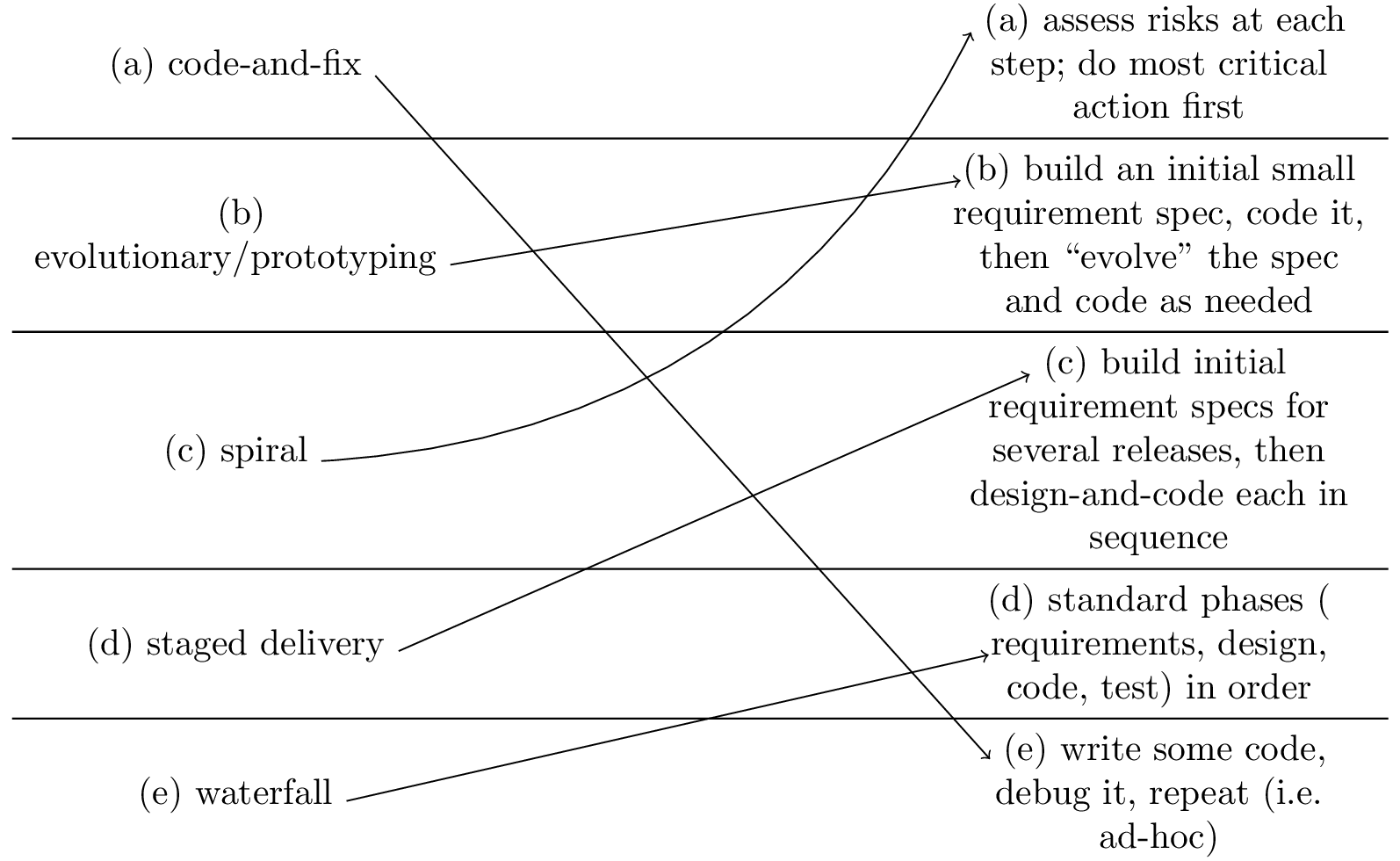Description
This is a LaTeX code that creates a table of software development methodologies and visualizes their relationships using arrows.
The code includes the following packages: tikz, tikzmark, booktabs, amssymb, and amsmath.
The table is created using the tabular environment, with three columns of equal width defined by the L column type, which centers the contents of the column and wraps the text. The table contains five rows, with a heading row and four data rows, each consisting of two cells separated by an empty cell.
The arrows are created using TikZ within a tikzpicture environment. The overlay and remember picture options are used to ensure that the arrows are drawn on top of the text in the table. The arrows are drawn using the \draw command, with the start and end points specified using the pic cs coordinate system. The shorten >=.5pt and shorten <=.5pt options are used to slightly shorten the arrows to avoid overlapping with the text.
There are also several tikzmark commands used to mark positions in the table where the arrows should start or end.
Keywords
TikZ, tabular, tikzmark, columns, arrows.
Source Code

\documentclass{standalone}
\usepackage{tikz}
\usetikzlibrary{tikzmark}
\usepackage{booktabs}
\usepackage{amssymb} % For more math
\usepackage{amsmath}
\usepackage{tabularx}
% no hyphens
\tolerance=1
\emergencystretch=\maxdimen
\hyphenpenalty=10000
\hbadness=10000
\begin{document}
% \begin{tabular}{cc}
% 14\tikzmark{a} & 78 \\
% 71\tikzmark{b} & \tikzmark{c}93 \\
% \end{tabular} \newline
\newcolumntype{L}{>{\centering \arraybackslash}m{4cm}}
\begin{tabular}{L L L}
(a) code-and-fix \tikzmark{a1} & & \tikzmark{a2} (a) assess risks at each step; do most critical
action first \\ \midrule
(b) evolutionary/prototyping \tikzmark{b1} & & \tikzmark{b2}(b) build an initial small requirement
spec, code it, then ``evolve'' the spec and code as
needed \\ \midrule
(c) spiral \tikzmark{c1} & & \tikzmark{c2} (c) build initial requirement specs for several releases,
then design-and-code each in sequence \\ \midrule
(d) staged delivery \tikzmark{d1} & & (d) standard phases ( \tikzmark{d2}requirements, design, code,
test) in order \\ \midrule
(e) waterfall \tikzmark{e1} & & \tikzmark{e2} (e) write some code, debug it, repeat (i.e.
ad-hoc)
\end{tabular}
\begin{tikzpicture}[overlay, remember picture, yshift=.25\baselineskip, shorten >=.5pt, shorten <=.5pt]
% \draw [->] ({pic cs:a1}) [bend left] to ({pic cs:e2});
\draw [->] ({pic cs:a1}) -- ({pic cs:e2});
\draw [->] ({pic cs:c1}) [bend right] to ({pic cs:a2});
\draw [->] ([yshift=.75pt]{pic cs:e1}) -- ({pic cs:d2});
\draw [->] ([yshift=.75pt]{pic cs:b1}) -- ({pic cs:b2});
\draw [->] ([yshift=.75pt]{pic cs:d1}) -- ({pic cs:c2});
\end{tikzpicture}
\end{document}